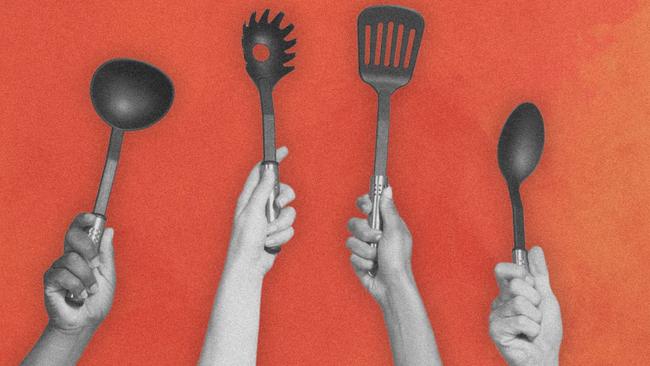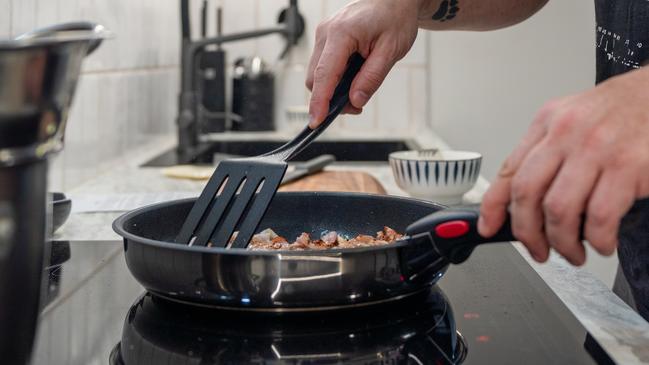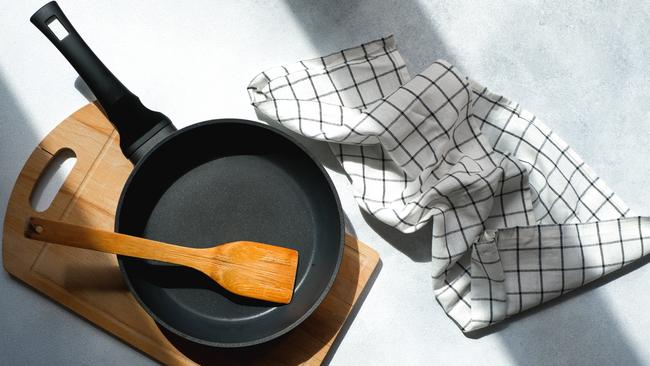Yes, you really should throw your old plastic spatula away
Chances are there’s a well-used plastic spatula, spoon or ladle near your stove. Scientists say it belongs in the bin.

It’s coming up to one of the biggest cooking weeks of the year for many families. Chances are there’s a well-used black plastic spatula, spoon or ladle near the stove. Scientists say it belongs in the bin.
A recent study adds to the evidence that black plastic household items — like the ubiquitous spatulas we all use to flip pancakes and turn steaks — are potentially harmful to our health, and that we should avoid them when we can. Wood and stainless-steel utensils are better options, health experts advise.
Researchers found high levels of flame retardants in some of the black plastic utensils and food-storage items that they tested, according to an October study in the journal Chemosphere.
Flame retardants are chemicals that are commonly used in manufacturing things like electronics, furniture and carpets to keep them from catching fire. But they can build up when they enter our bodies, potentially contributing to cancer, endocrine-system disruption and nervous-system damage, says Megan Liu, one of the study’s co-authors and science and policy manager at Toxic-Free Future. The environmental health-advocacy group conducted the study with researchers at Vrije Universiteit Amsterdam.
Manufacturers probably aren’t intentionally adding flame retardants to kitchenware, say Liu and other researchers. Instead, the scientists suspect that the black plastic in electronics is inadvertently ending up in everyday household products because it’s being recycled and reused in manufacturing material.
“This is clearly a contamination issue because these flame retardants shouldn’t be in our black plastic spatulas in the first place,” says Liu.
Cooking with black plastic utensils, especially sauteing foods in oil on a hot pan, accelerates chemical reactions and the release of flame retardants, says Andrew Turner, an environmental scientist at the University of Plymouth in the UK, who has researched black plastic. “These flame retardants leach out slowly over time anyway,” says Turner. “But if you heat it up and put it in oil, that will accelerate the process dramatically.”

Presence of flame retardants
Research by Turner, Liu and others has linked black plastic from recycled electronics to toys, kitchen utensils and other common household products, indicating that flame retardants are ending up in other items we use daily.
Most manufacturers likely aren’t even aware that flame retardants are in recycled plastic used in their products, says Tiffany Sanchez, an assistant professor of epidemiology at the Colorado School of Public Health, who has replaced her black plastic spatulas with stainless-steel ones.
“We’re not doing a good job understanding what chemicals are in our products,” says Edward P. Kolodziej, an environmental-science and engineering professor at the University of Washington Tacoma.
Most flame retardants are suspected carcinogens, says Turner. And studies looking at workers with high levels of exposure to flame retardants link them to a higher risk of certain cancers, particularly harder-to-treat breast, bladder and lung cancers, says Cathy J. Bradley, dean of the Colorado School of Public Health and deputy director of the University of Colorado Cancer Centre. Bradley says she limits her overall plastic use, opts for wooden kitchen tools and tries to avoid bottled water.
Distinguishing between the different kinds of flame retardants in a home can be hard for consumers, and not all of them are harmful to our health, says Turner.
The latest alarm over flame retardants in kitchenware comes on top of longstanding concern about PFAS — synthetic chemicals often referred to as “forever chemicals” — in non-stick pans. Experts say if the surface of such pans is intact the chemicals won’t leach into your food, but you should discard the pan if it’s scratched. The alternatives include cast-iron or stainless-steel pans.
Heather Stapleton, a Duke University professor and environmental chemist, says we don’t yet have enough information to determine how much of a health risk black plastic utensils pose.
“Not every black spatula is going to contain these chemicals,” she says, adding that the composition can vary among utensils and manufacturers.
The recent spatula study by Liu and her colleagues focused on two types of flame retardants: brominated and organophosphate. Certain types of brominated flame retardants are considered probable carcinogens by the International Agency for Research on Cancer, meaning there is strong, but not conclusive, evidence they can cause cancer.
Researchers tested more than 200 black plastic items for bromine; 43 per cent of items tested positive for it. They then selected the 20 products with the highest levels of bromine and found 85 per cent contained flame retardants, including spatulas, sushi trays and toy costume beads.
The study found a flame retardant known as decaBDE — which the U.S. banned in 2021 — in some of the products, including spatulas.

What you can do
Without testing, it’s nearly impossible to know if a black plastic item contains flame retardants. Most labels and manufacturing information don’t disclose whether an item is made from recycled materials, says Liu. And chances are the spatula in your utensil drawer has been there for a long while.
In addition to wood and stainless steel, silicone utensils might be OK, according to some scientists. Liu cautions that some might contain plastic as well as rubber, and that often isn’t disclosed on packaging. It’s best to avoid plastic in general because items might contain other chemical additives, such as phthalates, which are endocrine disrupters and pose other health risks, says Liu.
Liu recommends against reusing black plastic takeout containers, opting for glass containers instead. For toys, she suggests avoiding plastic toys that children are likely to put in their mouths.
Beyond black plastic, flame retardants can migrate out of other products in your home, contaminating air, dust and soil. Regularly mopping, dusting and vacuuming your home can help filter out potential contaminants, as can keeping rooms well-ventilated.
“These can help reduce any build-up of chemicals that may be accumulating in your dust,” Liu says.
The Wall Street Journal




To join the conversation, please log in. Don't have an account? Register
Join the conversation, you are commenting as Logout